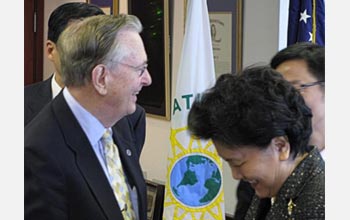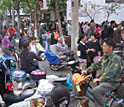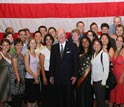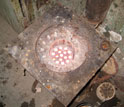News Release 09-073
NSF and People's Republic of China Extend China's Participation in East Asian Pacific Summer Institute Program

NSF Director Arden L. Bement, Jr., with Liu Yangong, a state councilor of the PRC.
April 16, 2009
This material is available primarily for archival purposes. Telephone numbers or other contact information may be out of date; please see current contact information at media contacts.
During a visit to the National Science Foundation (NSF), Liu Yandong, state councilor for science, technology, education, sport and culture for the People's Republic of China met with U.S. National Science Foundation (NSF) Director Arden L. Bement, Jr., to sign a formal agreement to renew the U.S.-China Cooperative Arrangement for NSF's Summer Institute in China Program.
This agreement enables the continuation of China's participation in NSF's East Asian Pacific Institute (EAPSI) program. EAPSI introduces U.S. graduate students to East Asia and Pacific science and engineering in the context of a research setting in host laboratories in host laboratories in China, Australia, Japan, Korea, New Zealand, Singapore or Taiwan, to help students initiate scientific relationships that will better enable future collaboration with foreign counterparts.
Bement and Vice-Minister for Science and Technology Li Xueyong, who accompanied Liu to the meeting, signed the only agreement that the delegation will sign during her visit to the U.S. The two met earlier at a lunch hosted by U.S. Secretary of Education Arne Duncan.
In 2002, the Ministry of Science and Technology (MOST) and NSF signed the U.S.-China Cooperative Arrangement for the Summer Institute in China Program, which supports U.S. graduate students to do research in China, as part of NSF's East Asia and Pacific Summer Institutes (EAPSI) Program. Under the arrangement, NSF has been selecting approximately 35 U.S. science and engineering graduate students annually to spend eight weeks doing research at universities and research laboratories in Beijing, Shanghai, Xian and Kunming.
While NSF funds only U.S. researchers, it is actively involved with other projects involving China. Currently NSF has active awards for 150 to 200 projects involving China, with a total NSF investment to the U.S. universities averaging between $15 and $20 million, covering all areas of basic research in science and education.
Among these, NSF's Partnerships for International Research and Education (PIRE) program supports innovative, international research and education collaborations. Each award is for up to $2.5 million for five years.
Six PIRE projects out of a current total of 32 are collaborating with China, in the areas of chemistry, biology, engineering, earthquakes, and environmental science. MOST is currently providing Chinese-aid funding for the project between the University of California at Santa Barbara and the Dalian Institute of Chemical Physics on surface chemistry and catalysis.
NSF and the National Science Foundation of China (NSFC) are actively engaged in climate change cooperation, with the second U.S.-China bilateral workshop on climate change scheduled for October 19-31, 2009, following on the first NSFC-NSF workshop on Climate Change held in Shanghai in August 2008.
-NSF-
-
EAPSI scholar Christopher Cherry studied the phenomenon of electric bikes in China.
Credit and Larger Version -
Summer Institute in China, Class of 2007, with Clark T. Randt, Jr., U.S. Ambassador to China.
Credit and Larger Version -
This scene from a parking lot in China drives home the growing popularity of electric bikes.
Credit and Larger Version -
Abigail Watrous, EAPSI participant in China, studied renewable energy technologies in China.
Credit and Larger Version -
A coal burning stove in a village outside of Beijing blazes hot.
Credit and Larger Version
Media Contacts
Lisa-Joy Zgorski, NSF, (703) 292-8311, email: lzgorski@nsf.gov
Program Contacts
William Y. B. Chang, NSF, (703) 292-7239, email: wychang@nsf.gov
Related Websites
EAPSI Program Guidelines: http://www.nsf.gov/funding/pgm_summ.jsp?pims_id=5284
Behind the Scenes, "My Research: I Burn Stuff," by EAPSI participant Abigail Watrous: http://www.livescience.com/environment/080530-bts-chinese-combustibles.html
Behind the Scenes: "40 Million Electric Bikes Spark Dilemma in China," by EAPSI participant Christopher Cherry: http://www.livescience.com/environment/071109-bts-electric-bikes.html
The U.S. National Science Foundation propels the nation forward by advancing fundamental research in all fields of science and engineering. NSF supports research and people by providing facilities, instruments and funding to support their ingenuity and sustain the U.S. as a global leader in research and innovation. With a fiscal year 2023 budget of $9.5 billion, NSF funds reach all 50 states through grants to nearly 2,000 colleges, universities and institutions. Each year, NSF receives more than 40,000 competitive proposals and makes about 11,000 new awards. Those awards include support for cooperative research with industry, Arctic and Antarctic research and operations, and U.S. participation in international scientific efforts.
Connect with us online
NSF website: nsf.gov
NSF News: nsf.gov/news
For News Media: nsf.gov/news/newsroom
Statistics: nsf.gov/statistics/
Awards database: nsf.gov/awardsearch/
Follow us on social
Twitter: twitter.com/NSF
Facebook: facebook.com/US.NSF
Instagram: instagram.com/nsfgov







